Description
About the Author
J. Samuel Barkin is Professor of Global Governance in the McCormack Graduate School of Policy and Global Studies at the University of Massachusetts Boston. Laura Sjoberg is Associate Professor of Political Science at the University of Florida.
Reviews
This book is a path-breaking work in International Relations, with implications that go beyond its immediate subject matter in critical theory and constructivism. This study convincingly demonstrates that constructivism does not entail any particular ideological position. A first-rate work of scholarship across the board, the volume will stand the test of time as a cautionary tale against tempting but ill-advised acts of synthesis, with critical theory and constructivism currently serving as the case in point."-Patrick James, Dornsife Dean's Professor, School of International Relations, University of Southern California
This is not a book that anyone should have had to write. Constructivism as a family of explanatory theories focusing on creativity and contingency, and critical theory as a political sensibility that embraces emancipatory possibilities, are basically orthogonal notions, and as such could operate in a complementary manner - or could have nothing to do with one another. That they get lumped together is an artifact of the peculiar history of theoretical debates in IR. The authors make the case for dissolving that forced unity in meticulous detail. Will this be the book that at last puts the IR habit of 'theoretical synthesis' to rest?"-Patrick Thaddeus Jackson, School of International Service, American University
14/01/2019
Book Information
ISBN 9780190463427
Author J. Samuel Barkin
Format Hardback
Page Count 232
Imprint Oxford University Press Inc
Publisher Oxford University Press Inc
Weight(grams) 748g
Dimensions(mm) 173mm * 246mm * 25mm







